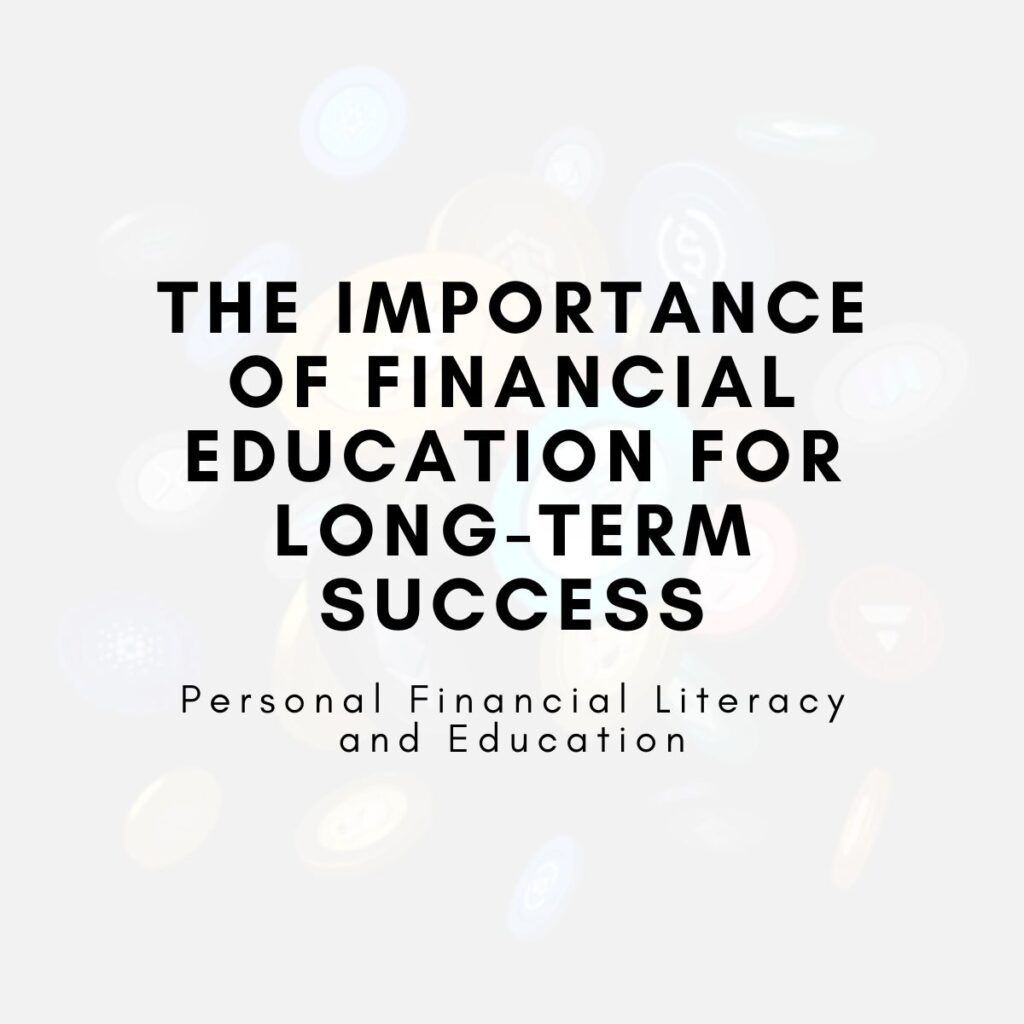
Why is financial education essential for long-term success?
Financial education equips individuals with the knowledge and skills needed to manage money effectively, make informed decisions, and achieve long-term financial goals. By understanding concepts like budgeting, investing, and debt management, individuals can secure financial independence and build wealth over time.
Summary Table: The Importance of Financial Education for Long-Term Success
| Category | Key Points | Examples |
|---|---|---|
| Why Financial Education Matters | – Empowers informed decision-making. – Helps in debt management. – Builds financial security. | Example: Understanding compound interest enables early investing for long-term wealth growth. |
| Key Components of Financial Education | 1. Budgeting and Saving: Tracking income and expenses. 2. Investing Basics: Learning about asset diversification. 3. Credit and Debt: Maintaining good credit and reducing debt. 4. Retirement Planning: Utilizing retirement accounts and compound interest. | Example: Applying the 50/30/20 rule for budgeting or saving $5,000 annually in a Roth IRA. |
| Avoiding Financial Pitfalls | – Overborrowing and impulse spending. – Ignoring savings and emergency funds. | Example: Avoiding payday loans by building an emergency fund equivalent to six months’ expenses. |
| How Education Drives Success | – Builds wealth over time through informed investment. – Helps plan for life milestones and emergencies. | Example: Investing in a diversified mutual fund can yield higher returns over 20–30 years. |
| Improving Financial Education | – Utilize online courses and resources. – Read personal finance books. – Seek professional advice. | Example: Completing a Coursera personal finance course or consulting a financial planner for tailored strategies. |
| Broader Impact | – Reduces economic inequality. – Increases national savings rates. – Encourages responsible consumer choices. | Example: Financial education initiatives in underserved communities help reduce wealth disparities. |
This table provides a clear and concise overview of the post, emphasizing key takeaways and practical applications.
Introduction
In today’s fast-paced world, financial education is more important than ever. It is the cornerstone of financial independence and long-term success, empowering individuals to navigate complex financial systems, avoid common pitfalls, and build sustainable wealth. Without proper financial education, managing money can feel overwhelming, leading to poor decisions that impact long-term stability. This guide will explore why financial education is vital, the benefits it offers, and practical ways to improve your financial literacy.
Why Financial Education Matters
Financial education is more than just understanding numbers. It is a life skill that impacts every aspect of personal and professional life. From budgeting and saving to investing and planning for retirement, financial literacy lays the foundation for informed decision-making.
Benefits of Financial Education
- Informed Decision-Making: Helps you understand the implications of financial choices.
- Debt Management: Teaches how to avoid excessive debt and effectively manage existing obligations.
- Wealth Creation: Guides you in building and growing wealth through informed investment strategies.
- Improved Financial Security: Prepares you for emergencies and unexpected expenses.
Example:
Consider someone who understands the concept of compound interest. They are more likely to start investing early, letting their wealth grow significantly over time compared to someone without this knowledge.
Key Components of Financial Education
Financial education covers a broad spectrum of topics. Mastering these areas ensures a comprehensive understanding of personal finance.
1. Budgeting and Saving
A solid financial plan starts with budgeting and saving.
- Budgeting: Tracking income and expenses to avoid overspending.
- Saving: Setting aside funds for emergencies and future goals.
Example: Using the 50/30/20 rule (50% needs, 30% wants, 20% savings) simplifies budget allocation.
2. Investing Basics
Investing is key to long-term wealth creation.
- Stocks and Bonds: Understanding market fundamentals.
- Diversification: Spreading investments to minimize risk.
Example: Investing $100 monthly in a diversified mutual fund can yield significant returns over time.
3. Understanding Credit and Debt
Good credit management is essential for financial stability.
- Credit Scores: Monitoring and improving your score.
- Debt Reduction Strategies: Snowball and avalanche methods for repayment.
Example: Maintaining a low credit utilization ratio boosts your credit score.
4. Retirement Planning
It’s never too early to start planning for retirement.
- Retirement Accounts: 401(k)s and IRAs.
- Compound Interest: Leveraging time to grow savings.
Example: Investing $5,000 annually in a Roth IRA from age 25 can lead to a comfortable retirement.
The Role of Financial Education in Avoiding Pitfalls
Many financial pitfalls stem from a lack of education. These mistakes can have long-term consequences, but awareness and education can prevent them.
Common Financial Mistakes
- Overborrowing: Taking loans without assessing repayment capacity.
- Impulse Spending: Spending on non-essentials without budgeting.
- Ignoring Savings: Prioritizing spending over saving for the future.
Example:
A financially educated individual is less likely to rely on high-interest payday loans, which can trap borrowers in a cycle of debt.
How Financial Education Drives Long-Term Success
Financial education empowers individuals to achieve financial independence and long-term goals. It provides the tools to overcome challenges and build a sustainable financial future.
1. Building Wealth Over Time
Understanding investment principles helps individuals grow their money.
Example: A $1,000 investment in a stock index fund with an average annual return of 7% grows to $7,612 in 30 years.
2. Planning for Life Events
Education prepares you for major milestones like buying a house, raising children, or retiring.
Example: Saving for a down payment avoids excessive mortgage debt.
3. Preparing for Emergencies
An educated individual understands the need for an emergency fund.
Example: Setting aside six months’ worth of expenses prevents financial strain during job loss.
Ways to Improve Financial Education
Becoming financially literate doesn’t happen overnight, but consistent effort can yield significant results.
1. Online Resources and Courses
- Platforms like Coursera and Udemy offer personal finance courses.
- Government websites provide free budgeting tools.
2. Reading and Research
Books like Rich Dad Poor Dad and The Total Money Makeover offer valuable insights.
3. Seeking Professional Advice
Financial advisors and planners can help create tailored financial strategies.
4. Practicing Financial Habits
- Track expenses regularly.
- Set monthly savings goals.
The Broader Impact of Financial Education
The effects of financial education extend beyond individuals. Financially educated communities contribute to stronger economies.
1. Reduced Economic Inequality
Educating underprivileged groups can narrow the wealth gap.
2. Improved National Savings Rates
Countries with financially literate citizens have higher overall savings rates.
3. Better Financial Decisions Globally
Informed consumers drive markets by making responsible choices.
Conclusion
Financial education is a lifelong journey with transformative potential. It equips individuals with the tools to make informed decisions, avoid costly mistakes, and achieve long-term financial success. By understanding core financial concepts, practicing healthy financial habits, and leveraging resources, you can build a secure and prosperous future. Begin today—invest in your financial education and watch it pay dividends for a lifetime.
Key Takeaways
- Financial education is crucial for managing money and achieving goals.
- Core topics include budgeting, saving, investing, credit management, and retirement planning.
- Avoid common financial pitfalls like overborrowing and ignoring savings.
- Continuous learning through courses, books, and professional advice is key.
- Financially educated individuals contribute to stronger communities and economies.




